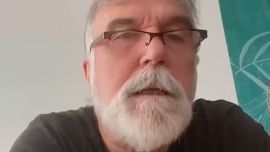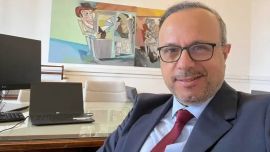Vice-President Cristina Fernández de Kirchner was at the centre of a political firestorm on Saturday after her trial for alleged corruption prompted clashes between riot police and supporters in Buenos Aires.
Fernández de Kirchner, 69, was backed by supporters across Argentina as they took to the streets for demonstrations at public squares across the country.
Thousands responded to a social media campaign and gathered peacefully in town squares across Argentina, though in Buenos Aires some supporters breached police barricades to reach Fernández de Kirchner's home.
Fernández de Kirchner, 69, has been indicted along with 12 others on charges of aggravated illicit association and fraudulent administration in a trial probing alleged corruption in the tender of public works projects when she was president between 2007 and 2015 in her stronghold in Patagonia.
Prosecutors have asked that she face 12 years in jail and a lifetime ban from politics.
Saturday's main protest took place outside the Senate chief's home in the wealthy Buenos Aires City neighbourhood of Recoleta. At least four people were arrested and 12 police officers were injured as flashpoints erupted at that gathering, with fences rushed by the demonstrators and police responding with tear gas and water cannons.
Fernández de Kirchner later addressed supporters from a makeshift stage in front of her home, delivering a speech in which she warned the security forces not to "return to the past" and accusing the opposition of wanting to "exterminate Peronism."
Tensions ran high throughout the day, but rose sharply after the government led by opposition leader and Buenos Aires City Mayor Horacio Rodríguez Larreta decided to fence off areas close to Fernández de Kirchner's Recoleta apartment, located on Uruguay and Juncal streets. Demonstrations have been ongoing in the vicinity since Monday, when the trial's prosecutor requested a 12-year jail sentence and a life ban from politics for the vice-president in response to the corruption claims.
Rejecting the imposition of fences, City Police hit demonstrators with water cannons and and tear gas, though the militants managed to persevere and reach Fernández de Kirchner's door.
Later that evening, after what she described as "a long day," the vice-president emerged from her home to address supporters. She once again denied the graft claims against her, criticised the heavy-handedness of the security forces and accused the opposition of wanting to jail her unjustly.
"There has been too much blood in Argentina for them to continue threatening those who think differently with gunfire, bullets, tear gas and pepper spray," the vice-president told the thousands of people in Recoleta who gathered to support her.
The ex-president, who ruled from 2007 to 2015, called on her opponents "to stop competing among themselves" about who hates Peronists more, referencing the political movement she subscribes to, based on the ideas of former ruler Juan Perón.
"It is incredible the degree of cynicism and perversion of not assuming and taking charge of what they want: to exterminate Peronism," said Fernández de Kirchner, who says she is being "persecuted" both politically and judicially and that her political space is under attack.
'Silenced'
"We came to support her because we know they are persecuting her and they want some voices to be silenced, so we are at peace waiting for the police to remove the fences," Gimena Martínez, an activist who travelled to Recoleta from San Martin in western Buenos Aires Province, said as she demonstrated.
For Damián Rigo, 51, the Buenos Aires City mayor's decision to put up fences "was a provocation."
"It is a symbol: while the justice system wants to imprison [Fernández de] Kirchner, [Rodríguez] Larreta imprisoned her in her home and we are not going to allow that," he said.
The area close to Fernández de Kirchner's apartment, which is situated in one of the capital's most wealthiest areas, has seen mobilisations, demonstrations and acts of support for the vice-president all week.
Banners including "Cristina is cared for by the people" and "Cristina is Perón" have been on display, along with thousands of images of the vice-president's face and the national flag.
At dusk, an angry group rushed the fences. Riot police responded with water cannons, tear gas and beat back demonstrators with batons at the established perimeter.
President Alberto Fernández said a post on social media that he considered that the security "operation, far from contributing to tranquillity, generated a climate of insecurity and intimidation."
The president considered it "imperative that the harassment of the vice-president @CFKArgentina ceases and that the right to free expression and demonstration of citizens is guaranteed."
Officials, deputies, political, trade union and social leaders joined the call in Recoleta.
Early evening, Rodríguez Larreta delivered a press conference tin which he said that the police had "acted with firmness, determination and professionalism." At least 12 police officers were injured in the clashes with demonstrators, he added.
He also complained that "what was initially an expression of support, turned into a permanent encampment" of protesters disrupting the peace of the neighbourhood, one of the most exclusive in the capital.
In contrast to the incidents in Recoleta, a host of other demonstrations in support of Fernández de Kirchner passed off peacefully, including those in the provinces of Tucumán (northwest), Córdoba (centre), Rosario (centre) and Mar del Plata, south of Buenos Aires.
Fernández de Kirchner is both vice-president and the Senate president and therefore enjoys parliamentary immunity.
Even if convicted – the verdict is expected at the end of the year – she would not go to prison unless her sentence was ratified by the country's Supreme Court, or she loses her Senate seat at the next elections at the end of 2023.
– TIMES/AFP



















Comments